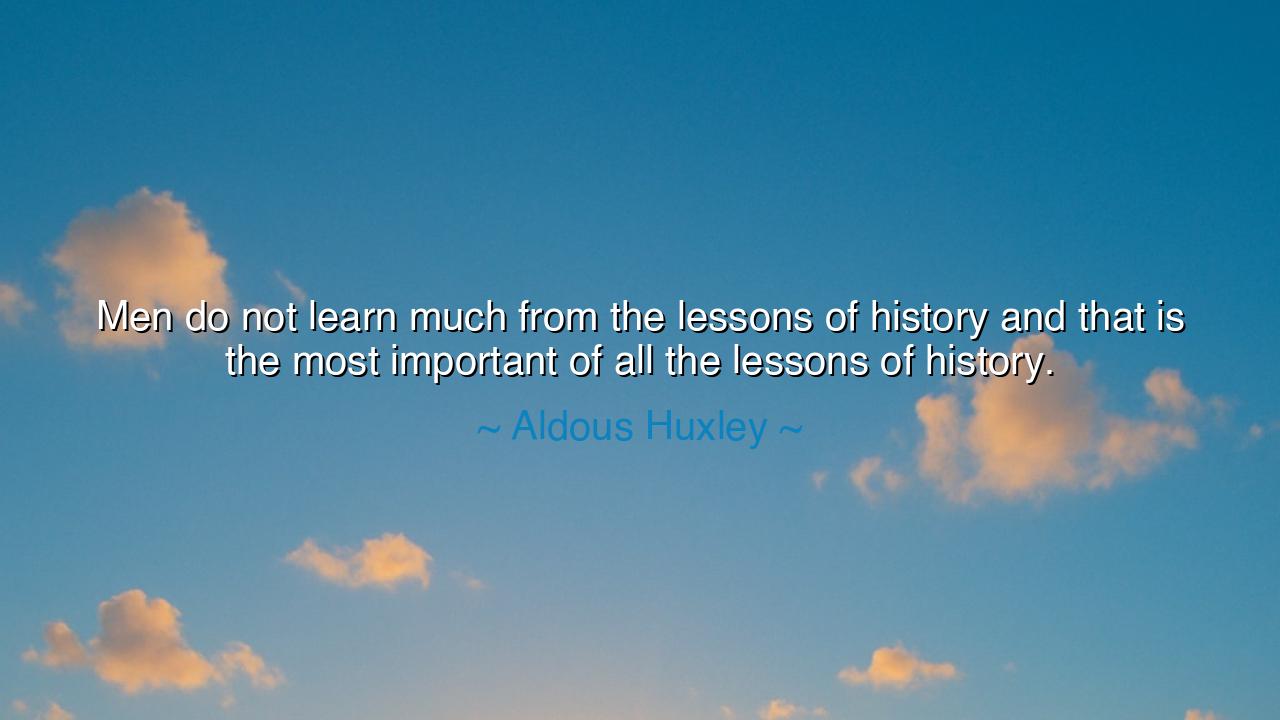
Men do not learn much from the lessons of history and that is the
Men do not learn much from the lessons of history and that is the most important of all the lessons of history.






“Men do not learn much from the lessons of history and that is the most important of all the lessons of history.” — Aldous Huxley
Listen, O seekers of wisdom, and ponder the words of Aldous Huxley, a prophet of the modern age and chronicler of the human spirit. In this declaration, he speaks with both sorrow and irony, for his message is not a celebration but a lament. He tells us that the greatest truth history teaches — the one that repeats through every age — is that mankind fails to learn from it. Empires fall, tyrannies rise, wars consume the innocent, and still we walk the same circle, as if cursed to forget the lessons our ancestors paid for with their blood. Huxley gazed upon the cycles of time and saw that progress of technology is swift, but progress of wisdom is slow — and therein lies the tragedy of humanity.
The origin of this thought comes from Huxley’s deep reflection on the turbulent history of the twentieth century — a time of marvels and madness. He witnessed a world that had birthed both the airplane and the atom bomb, both democracy and dictatorship. After the First World War, the nations had cried, “Never again!” Yet within a single generation, the flames of war rose higher than ever before. The Holocaust, the atomic shadows of Hiroshima, the crushing of freedom by new ideologies — all stood as monuments to the truth Huxley named: that mankind, for all its intelligence, remains forgetful of its own ruin.
He reminds us that history is not merely the story of kings and battles, but the mirror of the human soul. Each age reveals what we love, what we fear, and what we choose to ignore. Yet men, blinded by pride, look into this mirror and see only others’ mistakes. They say, “We are wiser now; that was a darker time.” But every era has believed itself wise — the Romans before their fall, the Victorians before their empires crumbled, the modern world before its disillusionments. Thus, the cycle continues, for as long as memory fades and arrogance endures.
Consider the fate of Athens, the cradle of democracy. It was a city of philosophers, artists, and dreamers — yet it destroyed itself through envy, greed, and war. When Pericles warned his people that arrogance would be their doom, they mocked him; when Socrates urged them toward virtue and reflection, they condemned him to death. Centuries later, their story became a lesson to all civilizations: that democracy without wisdom turns to chaos, and freedom without discipline breeds ruin. Yet today, the same struggles endure — nations still divide, leaders still deceive, and citizens still forget that liberty must be protected not by memory alone, but by moral courage.
Huxley’s insight burns brighter still when we consider how history’s lessons are often buried by comfort. People prefer the ease of forgetting to the burden of remembering. To remember is to feel shame, to face responsibility, to admit that we are not as different from the past as we pretend. Thus, textbooks simplify, monuments glorify, and the wounds of history are covered with the gauze of pride. But truth, though hidden, never dies. It waits, whispering through ruins and archives: “Remember, or repeat.” And those who do not listen, as Huxley foresaw, are destined to relive the mistakes of their forefathers.
Yet there is hope, even in his lament. For though most men do not learn, some do — and that is where the future begins. The teacher who refuses to falsify the past, the historian who seeks truth over comfort, the citizen who studies not to boast but to understand — these are the guardians of memory. They are the torchbearers in an age that forgets. Through their work, the lessons of history may yet become more than echoes; they may become guideposts. For the pattern can be broken — but only by those who have the courage to see it clearly.
So take this teaching, O reader, and inscribe it in your heart: Do not turn your eyes from the past, for it is both your warning and your wisdom. Learn not only the victories of history, but its failures. Question the comfortable lies that time repeats. Do not say, “That could never happen here,” for every evil once seemed unthinkable before it was born. Instead, remember — remember deeply, humbly, painfully. For the memory of humanity is the soul of humanity. If we lose it, we wander again into the same darkness. But if we keep it — if we truly learn — then, at last, the ancient circle will be broken, and we shall rise wiser than we fell.






AAdministratorAdministrator
Welcome, honored guests. Please leave a comment, we will respond soon